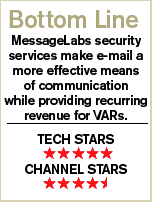Review: Send A Message To Spam

communications mode malware e-mail
On the plus side, those problems have created a cottage industry for VARs selling e-mail services and solutions to their customers. The range of offerings includes everything from content control to antispam to hosted e-mail services, and that's where MessageLabs comes in.
The company is offering a managed e-mail security platform to its partners for resale to end users. The MessageLabs Email services suite includes antispam, antivirus, content control, image control and encryption, all of which prove to be important considerations for today's corporate messaging solutions.
While spam has become the scourge of e-mail users, many still fail to recognize the importance of other problems that can be encountered when using unmanaged e-mail systems. MessageLabs takes on those problems by offering a platform that all corporate e-mail messages must travel through. That approach allows VARs to start with smaller solutions that offer excellent control over e-mail content and incorporate one or two basic services, such as spam prevention and antivirus. They can then sell additional services as the need arises and even offer a fully managed e-mail service.
VARs looking to jump on the e-mail control bandwagon will find MessageLabs' offering one of the easiest to deploy. Simply put, through its hosted e-mail offering, all of a customer's inbound and outbound messages travel through a MessageLabs mail server, which is where all of the security processing takes place. Not only does it make installation a simple matter of redirecting MX records, but an additional advantage is that no unwanted content ever enters the local network. That means all content filtering, antivirus and image processing takes place outside of the user's network, which adds an extra layer of protection and reduces traffic on network connections.
VARs will find installation, configuration and management of the product straightforward. While installation requires little more than redirecting a customer's e-mail to a MessageLabs server, configuration involves a few steps to ensure that the service is deployed properly. Luckily, MessageLabs makes that chore easy with its browser-based management console, which allows administrators to turn features on and off, define policies and generate reports.
The key behind making the service effective comes from defining policies, which can be companywide, departmentwide, for an individual or for a range of tests to be performed on inbound e-mails.
Starting with the antispam capability, administrators can define the policies in place for spam prevention. For example, an administrator can create global whitelists, which allow certain e-mails to come through the spam-filtering process. Users may also have the capability to create their own whitelists and blacklists for e-mail messages. That helps to cut down on false positives. The vendor claims that its spam filtering is over 99 percent accurate.
Next: The Bottom Line The image-filtering component works similarly: Administrators define a policy and the image-filtering engine executes it. The primary function of image filtering is to keep inappropriate content out of people's inboxes.
One of the most important capabilities MessageLabs offers is an antivirus service. Every incoming e-mail is checked for malware using a multilayered process that identifies and eliminates viruses and other pieces of malware. Once again, this all takes place outside of the customer's network, meaning that bad code never has an opportunity to enter it. Because of the multiple malware tests employed, MessageLabs is accurate in claiming a near 100 percent protection rate against viruses, trojans, spyware and adware.
For customers worried about data-leakage problems, MessageLabs' content-control option proves to be a valuable add-on. Here administrators define what content is appropriate for both inbound and outbound traffic. Different rules can be defined for inbound and outbound, and the product offers generic categories for creating a policy. The real power comes from the outbound control, which can be used to identify trade secrets or sensitive information being transmitted to outside sources. That feature will require a bit of planning and configuration on the administrator's part—creating consulting opportunities for solution providers—as there are several elements to be considered when determining what can be transmitted. Administrators can take the easiest route and just block attachments and identify certain keywords, but that proves to be inefficient over time. The key to success for outbound filtering comes in the form of fine-tuning the policies while actively monitoring e-mail traffic.

While MessageLabs makes e-mail control a relatively simple and painless process, VARs will be pleased to know that expertise and hands-on management make the product (and its options) most effective. VARs can choose to "drop the product in" and then turn it over to their customers, or actively manage the e-mail environment for a fee, providing true flexibility when it comes to building a services-based business.
MessageLabs empowers its partners by providing extensive reporting capabilities. Those reports can be used to demonstrate ROI, speed investigations and demonstrate product effectiveness. VARs can generate custom or automated reports that show how much spam was blocked, viruses that were prevented and user activity, any of which prove to be valuable to an organization's management.
Partners can profit using two different methods: Associate-level partners that provide leads earn 15 percent on the sale of the service. More formalized partners can establish ongoing relationships with customers and provide billing, provisioning and support for additional profits. The company sells its services either as a branded or white-label solutions.
Partners looking to generate high margins and recurring revenue will want to consider co-branding or private-labeling MessageLabs' e-mail security services. The company provides a dedicated representative who works with each partner to develop a high-impact service launch and a sales and marketing plan. Each reseller also receives a comprehensive startup kit, along with training and online technical support. Specific programs can also be customized. VARs can expect margins in the range of 15 percent to 40 percent of the net annualized recurring revenue.